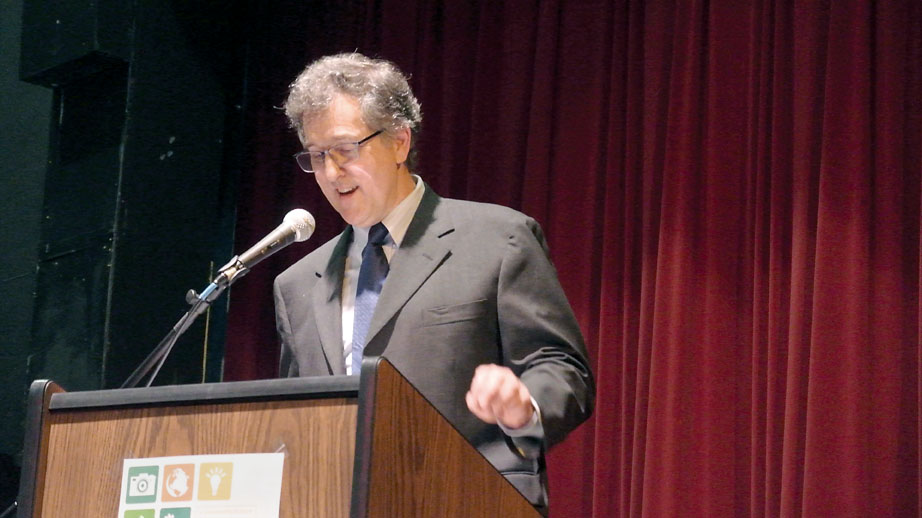PORT TOWNSEND — The skillful use of language is the most important tool used in the judicial system, according to a judge who made headlines before speaking to a collection of local students, faculty and community members.
“Some would say that the tools we use in the courtroom are constitutions, statutes, rules, rulings and initiatives,” King County Superior Court Judge William Downing told an audience of about 250 people in the Port Townsend High School auditorium Friday.
“But the most important material involved are the words that make up those things. The ongoing vitality of the language and the need makes it a specialty for those who are using the language.”
Downing said there are judges who are fascinated by the intricacy of the law and others who are smitten with the skills exhibited by lawyers but that he is neither.
“There are noble lawyers and plodding lawyers,” he said.
“The most effective ones are those who know the intimate relationship between the law, the society and the language.”
Downing was booked to appear as part of the school’s series of Friday Salons several months ago, so it was coincidental that he was in the news Thursday following his ruling on a tax-limiting measure sponsored by activist Tim Eyman.
Initiative 1366 was approved by voters in November and, if enacted, would have cut the state’s sales tax by 1 percentage point beginning in April unless the Legislature allowed a public vote on an amendment demanding a two-thirds majority for tax increases in the future.
Downing ruled the measure was a thinly disguised effort to propose a constitutional amendment, which cannot be undertaken by initiative in Washington.
Eyman’s supporters are expected to challenge the ruling, something that is not on Downing’s radar.
“I write a ruling for the benefit of the public,” Downing said after his presentation.
“I don’t write the ruling for the appellate courts or the lawyers. Rather, I write it so the public can understand it, so they don’t see it as part of a personal political agenda [but instead] see it as something that has been reasoned out in a way that is consistent with the law.”
Downing said all judges bring their own perspective to a ruling.
“It’s not a political perspective but the application of words and phrases,” he said.
He said he was worried about the politicization of the U.S. Supreme Court but that local courts are “pretty much above politics.”
“It’s part of the national political theater and is pretty hard to de-escalate,” he said of the Supreme Court.
“It resembles the arms race between the United States and Russia in the 1950s and the 1960s.”
During his presentation, Downing said some lawyers use language in the same way a drunk uses a lamppost — “for support but not for illumination” — and compared judges to sea life.
“Some people say that when they are in the courtroom, judges should display the demeanor and personality of a goldfish,” he said.
“It’s also said of judges that we resemble oysters, and there’s some truth to that. Oysters don’t get around much; they hang out in their beds and get their sustenance from whatever floats by.”
Downing said if a court only strives to get the “right” result, it has failed.
“It should be widely seen that we use a fair and understandable process for resolving disputes where the courts gain their legitimacy,” he said.
“That foundation builds public trust and confidence and, therefore, respect for the laws.”
People will comply with the law as long as they know there is a fair mechanism in place that will put things back on track, he said.
While in Port Townsend, Downing also presided over a student mock court.
Downing’s visit had much to do with his longtime friendship with language arts teacher Chris Pierson, who said the presentation stimulated the students and provided a level of discourse that can be used in the classroom.
“It was a fairly erudite, dense talk,” Pierson said.
“The kids were focused, and it went fast.”
________
Jefferson County Editor Charlie Bermant can be reached at 360-385-2335 or cbermant@peninsuladailynews.com.

